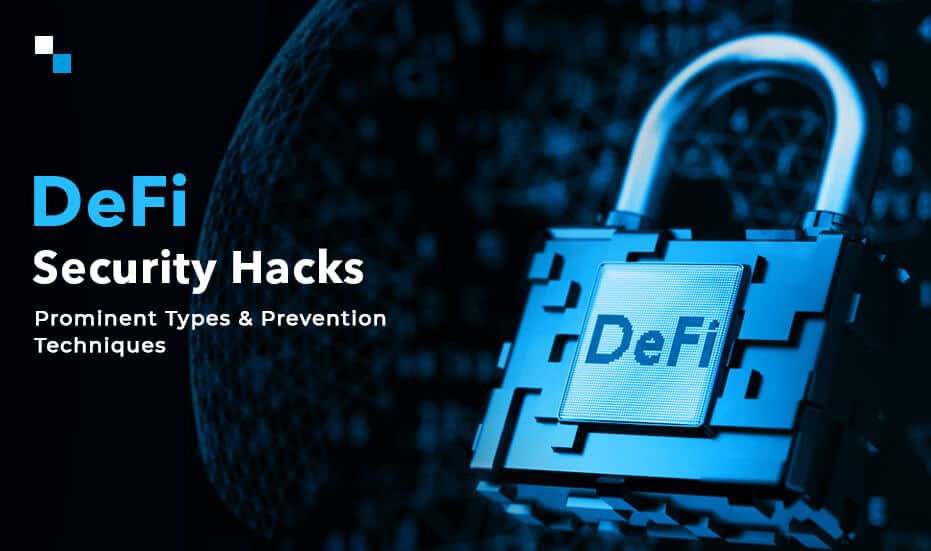DeFi involves the use of blockchain for the removal of conventional intermediaries from the traditional financial system. There is no denying that DeFi has been responsible for the introduction of major changes in accessibility. However, the risks of DeFi security hacks and attacks have raised a lot of concerns. It will be surprising to know that the total amount lost to DeFi hacks and scams was more than 204 million dollars in the second quarter of 2023. Thus, it becomes extremely important to understand that decentralized finance is not a random trend in emerging technologies but a new definition of the future financial ecosystem.
Significance of Understanding DeFi Hacking Techniques
DeFi has drawn a considerable volume of criticism in recent times due to the rising frequency as well as the magnitude of hacks and attacks. The increasing concerns about DeFi exploitation can play a significant role in preventing users from adopting DeFi protocols. Different reports reveal that the damage done by DeFi attacks in the industry has consistently gone up over the past few years.
Another point of concern was the decline of the TVL (Total Value Locked) in the DeFi market. The collapse in the value of stablecoin was the major reason behind the reduction in TVL points. Another reason behind the downfall of TVL in DeFi was the financial losses due to vulnerabilities in DeFi protocols and tokens. Thus, DeFi attacks can give rise to a loss of trust in the feasibility of decentralized finance as an alternative to traditional or centralized finance. Therefore, it becomes quite significant to gain an in-depth understanding of the different types of DeFi hacks and their prevention techniques.
Types of DeFi Security Hacks and Their Prevention
Now, let us delve deep into learning the different types of DeFi security hacks & frauds and how to prevent them in the right way.
Hacks
1. Smart Contract Vulnerabilities
Susceptibilities in smart contracts permit evil-intentioned actors to make use of the weaknesses and remove funds. Some of the most common vulnerabilities in smart contracts include rebounding attacks, defective logic, and unchecked input from users. For instance, we can consider the DAO Hack in 2016, which was one of the earliest and most noteworthy DeFi attacks. There was a vulnerability in the smart contract of the DAO that allowed a malicious player to clear out approximately 3.6 million Ether (ETH) from the platform. In this regard, hiring a smart contract security audit service can prove to be of great help to check out the flaws in the smart contract.
Ways of Prevention
Making use of well-established design patterns and following the best coding practices in the development of smart contracts can readily reduce the risk of vulnerabilities. The most common smart contract coding language for Ethereum is Solidity which provides coders with detailed guidelines as well as proper recommendations to make coding completely secure.
- Reviewing the Code Thoroughly
It is recommended to get the code reviewed thoroughly by any experienced smart contract audit firm that can identify all potential vulnerabilities in the smart contract prior to deployment to ensure better security.
- Conducting Security Audits
It is ideal to conduct smart contract security audits so that any kind of vulnerabilities in the smart contracts can be readily identified and improvements can be suggested accordingly.
- Extensive Testing
It is essential to carry out extensive testing, including an array of unit tests, integration tests, as well as stress tests, to make sure that the smart contracts perform accordingly to appropriately deal with different types of scenarios in a secure manner.
- Making Use of Formal Verification
Considering the use of different formal verification tools such as Slither, Mythril, or Truffle’s suite of tools for the purpose of analyzing the code of smart contracts code in order to properly identify potential vulnerabilities.
- Being Careful of All External Calls
It is of utmost importance to use external calls in a judicious manner and be extremely cautious at the time of interacting with any external contracts. It is recommended to be aware of all the potential risks associated with calling any untrusted or unknown contracts.
a). Reentrancy Attacks
Reentrancy attacks refer to DeFi security hacks that can evacuate funds from smart contracts funds by often calling the withdraw function following a malicious contract makes a recursive call back to the original function.
Ways of Prevention
Reentrancy attacks can be prevented in the following ways.
- Employing the “Checks-Effects-Interactions” Pattern
You need to follow the “checks-effects-interactions” pattern as advised in Solidity and Ethereum development best practices. It means that you need to perform all calculations and checks prior to interacting with any of the external contracts.
- Implementing Withdrawal Patterns
It is ideal to employ separate functions for withdrawing funds from a contract and make sure that withdrawal can only be initiated by the owner or any authorized parties.
- Using the “Transfer” and “Send” Functions Judiciously
At the time of transferring funds to any external addresses or contracts, it is appropriate to use the “transfer” or “send” functions instead of “call” whenever possible. Making use of these functions restricts the amount of gas forwarded to the external contract, thereby playing a vital role in cutting down the risk of reentrancy.
- Using the Latest Version of Solidity
Always keep the smart contracts updated by using the latest version of Solidity. Newer versions usually come with improved security features and optimizations.
- Inspecting for Known Vulnerabilities
Utilize different tools such as static analyzers, automated security scanners, etc. to inspect for any known vulnerabilities in the smart contracts. Additionally, tools such as Slither and MythX can help identify potential issues.
- Reentrancy Guards
Ensure the implementation of reentrancy guards at various critical points in the code to prevent recursive calls to external contracts. These guards help limit further interactions whenever a function is already in progress.
- Restricting the Use of “External” Functions
Make sure to limit the use of the “external” visibility modifier especially for functions that interact with other contracts. You can use “private” or “internal” for functions that cannot be accessed externally.
- Avoiding Complex Logic in “Fallback” Functions
It is ideal to keep the “fallback” function extremely simple and avoid complex logic or external calls. Using a specific function for dealing with incoming Ether transfers is recommended.
- Conducting Security Audits on a Regular Basis
Seek the help of professional smart contract audit firms and carry out security audits on a regular basis to look out for any address vulnerabilities.
- Security Standards
Always stick to security standards such as ERC-20, ERC-721, or any other relevant standards at the time of crafting DeFi protocols or tokens since they usually include the recommended security practices.
Want to Build a Secure DeFi Solution?
Schedule Free Demob). Oracle Manipulation Attack
The manipulation of oracles happens to be another DeFi hacking prevention technique. Different DeFi protocols like the price of assets depend on oracles in order to fetch external data. Hackers tend to alter oracles so that false data can be provided, thereby leading to incorrect execution of smart contracts.
Ways of Prevention
Here are a few ways in which manipulation of oracles can be prevented.
- Using Only Trusted Oracles
Choosing only trusted and reputed Oracle providers that have proven reliability and security is recommended. Witnet, Band Protocol, and Chainlink are some common Oracle providers.
- Implementing Decentralized Oracles
The implementation of decentralized oracle networks ensures the aggregation of data from several sources and depends on a network of validators or nodes for providing data. Hence, they are less susceptible to alteration by any single party.
- Aggregating Data from Several Sources
Data aggregated from several sources needs to be implemented to decrease the risk of alteration. This, in turn, makes it more difficult for hackers to alter data since they are aggregated from multiple sources.
- Checking Data Quality and Security
Implementation of data quality checks within the smart contracts for the verification of the accuracy, as well as reliability of incoming data, proves to be fruitful against data manipulation. Any inconsistent or suspicious data needs to be rejected immediately.
- Delaying Data and Averaging
It is appropriate to bring in time delays prior to depending on any external data to permit verification and several data points to be collected. Averaging data from a number of sources over a certain span of time readily reduces the impact of outlier data points.
- Utilizing Decentralized Governance
It is advisable to utilize decentralized governance mechanisms for the determination of data sources and oracle adjustments, thereby preventing the alteration of data as in the cases of centralized mechanisms.
- Tracking the Activity of Oracle
Continuous tracking of the activity of the Oracle, including the sources and feeds of data, for any kind of unusual behavior or deviations is recommended. It is ideal to set up alerts whenever abnormal activity is detected.
- Tokenizing Oracle Data
Tokenize the oracle data by creating tokens that represent particular data points which permits users to verify as well as trade the data, thereby adding an additional layer of transparency & security.
2. Phishing and Social Engineering
Phishing and social engineering happen to be another of the DeFi hacking techniques undertaken by hackers. Hackers make use of phishing websites, ill-natured links, and impersonation to deceive users into transferring funds to fraudulent addresses or revealing their private keys.
Ways of Prevention
Some ways to prevent phishing and social engineering are as follows:
- Verifying URLs of the Websites
Make sure to double-check the URLs of websites and platforms you visit. You need to be aware that several phishing websites usually have URLs that look very similar to legitimate ones but have slight variations or typos. So, you need to ensure that only the correct websites are visited.
- Using Browser Extensions
Making use of browser extensions or plugins can help identify and block known phishing websites. MetaMask’s built-in phishing detector and Ethereum’s EtherAddressLookup are some of the popular extensions.
- Being Aware of Unsolicited Communications
Remember not to click on links or download any attachments from any unsolicited messages, emails, or even social media posts. It might seem that the message is from a trusted source, but you need to keep in mind that might be a phishing attempt.
- Verifying Social Media Profiles
Prior to interacting with DeFi projects or individuals on any of the social media platforms, it is mandatory to verify the authenticity of their profiles. Scammers tend to create fake profiles to impersonate legitimate projects or influencers.
- Enabling 2FA Everywhere
Enabling two-factor authentication (2FA) on all online accounts, particularly the ones associated with DeFi adds an additional layer of security, thereby making it more difficult for hackers to gain access.
- Educating Yourself and Staying Informed
It is always recommended to educate yourself and stay informed about the latest phishing techniques & social engineering tactics used by hackers so that you can always be prepared as well as recognize them beforehand.
- Relying on Trusted Sources for Information
You should rely only on trusted sources to get information for DeFi projects and updates. Make sure to trust only the official websites, official social media accounts, and reputed news sources.
- Double-Checking Messages and Requests
Whenever you receive any messages or requests asking you to provide sensitive information, you need to cross-check its authenticity before putting forward any response.
- Verifying Smart Contract Addresses
Hire an experienced smart contract audit firm to verify the DeFi project’s smart contract address prior to interacting with it.
3. Front-Running
Front running takes place at the time when any hacker capitalizes on the delays in the execution of transactions by placing their transaction in front of the transaction of another user to earn profit from the price discrepancies.
Ways of Prevention
Here are a few effective strategies that can prevent or alleviate front-running in decentralized finance.
- Making Use of Decentralized Exchanges or DEXs with Order Matching
Making use of DEXs that carry out order matching mechanisms, like automated market makers such as Uniswap or decentralized order book exchanges such as SushiSwap can readily lessen the opportunity for front running as compared to placing orders manually in a centralized exchange.
- Avoiding Trading Strategies That are Easily Predictable
Front-runners typically target trading strategies that are easily predictable. So, it is ideal to avoid the consistent placement of large trades at the same time or using patterns that can be identifiable easily, thereby reducing the predictability of trades.
- Using Limit Orders
Making use of limit orders instead of market orders is recommended. Market orders are executed immediately at the present market price whereas limit orders permit the specification of a price at which users are willing to buy or sell, thereby playing a significant role in decreasing the risk of front-running and slippage.
- Utilizing Techniques That Preserve Privacy
The focus should be on using DeFi solutions that preserve privacy and conceal the trading intentions of users. Making use of technologies such as zero-knowledge proofs protect orders from hackers by hiding the details until the execution is complete.
- Layer 2 Solutions
There are some Layer 2 scaling solutions like zk-Rollups that provide highly secure as well as private trading environments. This, in turn, lessens the exposure to front-running attacks on the Ethereum mainnet.
- Delaying Transactions
Another DeFi hacking prevention technique for front-running is to delay the execution of transactions by a few blocks so that it becomes less profitable for hackers. There are a few wallets and DeFi platforms that permit users to set a custom transaction delay.
- Being Aware of the Gas Price
One should be extremely cautious of the gas price used for the transactions. It is to be kept in mind that high gas prices can lure hackers since they might expect the transaction to be a market-moving trade.
- Using Only Trusted Tools
It is always advisable to make use of only well-known DeFi platforms, wallets, and tools that come with stringent security features or practices for alleviating front-running appropriately.
- Multi-Step Transactions
Another way to prevent front-running is to use multi-step transactions. It can be done by breaking down complex transactions into several steps to make it difficult for hackers to predict user intentions.
Smart Contract Audit by a Team of Experts!
Schedule Free Demo4. Flash Loan Attacks
Flash loans are referred to as loans without any kind of collateral that are borrowed and repaid within only one transaction usually. DeFi flash loan attacks occur when hackers make use of flash loans to alter prices or exploit any existing DeFi flash loan vulnerability in DeFi protocol. For example, we can consider bZx. bZx is a DeFi lending platform that suffered a number of flash loan attacks in February 2020 resulting in huge volumes of losses.
Ways of Prevention
Preventing DeFi crypto flash loan hacks requires the following steps.
- Ensuring the Use of Trusted DeFi Platforms
The choice of a trusted, reputed, and reliable DeFi platform for borrowing, lending & trading plays a significant role in eliminating DeFi platforms vulnerability. It is because these platforms possess much better security and come with stringent security measures to protect against DeFi flash loan attacks.
- Monitoring Security Audits
It is important to check whether the DeFi project has undergone smart contract auditing by a professional service provider. The audited reports have the capability to provide detailed insights into the potential susceptibilities along with the existing security practices.
- Implementing Circuit Breakers
Circuit breakers can be implemented in the DeFi protocols to allow them to stop trading or withdrawals whenever any kind of suspicious activities or abnormal market conditions are detected. For instance, the MakerDAO system comes with a Governance Security Module (GSM) that plays the role of a circuit breaker.
- Restrict Access to Flash Loans
Top-rated smart contract audit firms always implement stringent measures to restrict access to flash loans by limiting certain functions or contracts within the DeFi protocol. This, in turn, can alleviate potential hacks.
- Utilizing Oracles with Safeguards
DeFi projects usually depend on oracles for external data. Therefore, it is great to make use of oracles having proper mechanisms in place that help prevent any kind of hacks or manipulation. For the prevention of erroneous data, some oracles implement safeguards.
- Making Use of Wallets with Multiple Signatures
The use of wallets with multiple signatures for the management of huge volumes of DeFi assets or cryptocurrencies makes it much more difficult to exploit flash loans by a single person since multiple signatures are necessary to approve any transaction.
- Changing Code Gradual
Professional smart contract security audit service providers make sure to implement significant code changes gradually and with utmost caution. This, in turn, allows sufficient time for the testers to review the code and test the changes thoroughly, thereby helping to detect all potential susceptibilities beforehand…
- Limiting the Size of the Transaction
Limiting the size of all transactions or activities readily reduces the overall impact of any flash loan attack.
- Keeping an Eye for Any Unusual Activity
It is essential to keep a close eye on all DeFi accounts for any kind of unusual or unexpected transactions. The earlier they are detected, the easier it becomes to alleviate losses.
- Staying Informed is the Key
Staying updated and informed of all the latest developments in the space of DeFi is the key to preventing attacks. It is recommended to always be prepared with strategies and implement them accordingly with the evolving landscape.
- Diversifying Holdings
Experts always recommend diversification of holdings across different platforms as well as assets to bring about a reduction in the impact of a single attack on the entire portfolio.
5. Private Key Compromise
Compromising a private key can result in devastating consequences. It is because of the fact that individuals control their crypto assets and interact with DeFi protocols with the help of private keys. If any hacker gains access to the private key of a user, they are able to control the assets and steal them.
Ways of Prevention
Here is how to prevent and respond to a private key compromise in DeFi.
- Making Use of Hardware Wallets
Hardware wallets such as Trezor, Ledger, etc. are offline devices for storing private keys and need physical confirmation for any transactions.
- Selecting a Secure Wallet Software
Make sure to select a highly trusted, reliable, and well-reviewed wallet software application with robust security features, including encryption and multi-factor authentication (MFA)to be assured of enhanced safety.
- Enabling Two-Factor Authentication (2FA)
Whenever possible, it is ideal to enable 2FA for the wallet accounts wherever possible. This, in turn, provides an additional security layer by needing a one-time code from any secondary devices or apps for wallet access.
- Securing Password Practices
It is to be made sure to always choose strong and unique passwords for wallet accounts. You can also consider the use of a password manager for the purpose of generating and storing complex passwords in a safe & secure manner.
- Being Aware of Phishing
You need to be aware of different attempts for phishing. Make sure to verify the URLs of websites and never click on any suspicious links. Never ever share the private key or recovery phrase with anyone. Cross-check for the websites’ authenticity whichever you visit.
- Keeping Private Keys Offline
If you’re not actively trading or using your assets, Store the private keys offline in an extremely secure location, like a paper wallet or a hardware wallet, especially at the time when you are not trading actively to lessen the risk of online attacks.
- Backing Up Recovery Phrases Securely
Secure backing up of recovery phrases in several offline locations is advised instead of opting for digital storage.
- Using MPC Wallets
Making use of MPC wallets permits several parties to jointly reckon a function over their inputs while keeping those inputs completely confidential. These wallets offer private key security, prevent unauthorized transactions, protect against phishing attacks, and reduce single points of failure to readily enhance the security of DeFi protocols.
Frauds
Rug Pulls and Exit Scams
DeFi projects with anonymous developers might perform rug pulls, where a project is created, funds are attracted, and then suddenly shut down or exit with the funds.
Ways of Prevention
Some of the major ways of preventing rug pulls and exit scams are discussed below.
- Conducting Due Diligence
Prior to investing in any DeFi projects, it is always recommended to conduct thorough research of the team behind it. Make sure to check the team’s background, credibility, and experience.
- Checking the Reputation of Community
The reputation of the community of the DeFi project is a matter of immense importance. It is ideal to join all communication channels of the community and engage with the members to gather all necessary information. Avoid DeFi projects with no active community or where communication is limited.
- Auditing Reports
Conduct a smart contract security audit by hiring a professional service provider. Auditing smart contracts can offer assurance that the code has been appropriately reviewed for vulnerabilities. Here it is to be remembered that auditing reports do not guarantee the absence of risks associated with rug pull.
- Verifying Smart Contracts
The code of smart contracts needs to be reviewed on public repositories like GitHub and inspected for any kind of potential irregularities or vulnerabilities.
- Contract Ownership
The contract ownership and control mechanisms need to be inspected to make sure that developers do not have further over them.
- Choosing Only Trusted Platforms
Make sure to choose only well-established and trusted DeFi platforms for lending, trading, and yield farming since they are safer in terms of transparency as well as security.
- Verifying Token Addresses
Every user should make sure to double-check the addresses of tokens prior to investing or trading. It is possible that hackers might create tokens with similar names to cheat users.
- Avoiding Anonymous Projects
Choose DeFi projects with caution and avoid projects with anonymous developers. It is true that all anonymous projects are scams, but it becomes tough to hold any individual accountable whenever something goes wrong.
- Not Falling a Victim to High Returns and Vague Promises
You need to be mindful while choosing DeFi projects and be aware of projects that promise abnormally high returns with very little or no risk.
- Diversifying Investments
One of the keys to DeFi hacking prevention is diversifying investments since it can alleviate the impact of a rug pull on the overall portfolio.
- Setting Investment Limits
It is a very good idea to set a limit on the amount of capital investment for a DeFi project which can help prevent voluminous losses in the event of a rug pull.
Get Obligation Free Quote
[widget id=”custom_html-3″]
Closing Thoughts
After reading through the post, one can get detailed insights into different types of DeFi security hacks and the appropriate ways to counter them in the right way to stay protected. However, there can be several other types of security threats associated with DeFi projects. Users should always keep in mind that the DeFi space is continuously evolving and hence security always remains a matter of concern. In order to remain protected, users should always be cautious at every step and be up to date with all the latest occurings in the world of DeFi.








